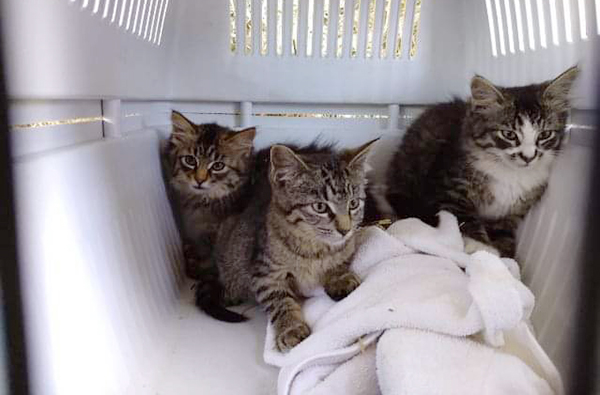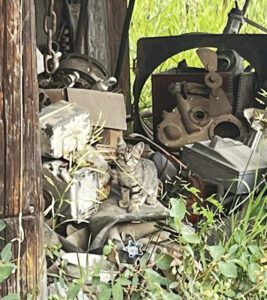Home »

The humane solution to the problem of feral cats
Imagine being forced to live on the streets, having to forage for food, find shelter from all types of weather conditions, be hunted by predators, at risk of being hit by a vehicle, or of being abused. This is the life of a feral cat.
The issue of feral cats is one that continues to grow. In fact, Wildlife Animal Control states that “within seven years’ time, one breeding duo that can reproduce two times a year is capable of having nearly 420,000 litters.” That’s a lot of cats! And worse yet, that’s a lot of cats suffering.
Ferals and strays live harder and shorter lives than owned cats. They need to find their own food, water, and shelter, through all sorts of weather conditions. According to a study printed in the Journal of Wildlife Management, “Cats that live outdoors, even just part of the time, are at risk of death from other cats, predators, and vehicles, as well as diseases such as rabies, feline leukemia, and parasites.”
Both feral and owned cats that are allowed to roam freely also kill wildlife. It’s estimated that stray, feral, and owned pets roaming freely kill up to 350 million birds per year in Canada. [Feral cats are born and live in the wild, with little human contact. A stray cat may be currently homeless but was once a pet that lived with humans].
But other than spaying or neutering our pets and keeping them indoors or in a catio, what can we do about the problem?
The most humane and effective method of controlling the feral cat population is TNR – Trap, Neuter, Release.
Since Meant 2B Loved Pet Rescue was incorporated as a Society in January 2021, they, with support from the SPCA – East Kootenay and the Creston Veterinary Hospital, have engaged in TNR campaigns in Riondel, Creston, Fairmont, Kitchener, Meadowbrook, Fort Steel, Fernie, Gold Creek, New Lake, Cranbrook, Jaffray, Wasa, Fernie, St. Mary’s, Canal Flats, and Koocanusa.
One TNR campaign resulted in 80 adult cats (most not spayed or neutered) and about 60 kittens. Thankfully ICAN in Invermere and PAWS in Creston helped out by taking some of the kittens and will potentially be able to take some more as TNR campaigns continue.
In addition to helping to control the feral cat population, TNR programs also help to reduce nuisance behaviours such as male cats spraying or the fighting and yowling that often disturb the sleep of nearby humans and can result in injuries to a cat or cats who won’t have access to veterinary care.
Lack of immunization, parasite control, adequate nutrition, and hygiene put feral cats at risk of many life-threatening problems, not to mention predators, vehicles, and sadly, some human beings.
 When a TNR is required, a M2BL volunteer will, with the use of humane live traps, capture both the adult cats and their kittens, and transfer them to a veterinarian to be checked out (no easy feat with a feral cat, to say the least).
When a TNR is required, a M2BL volunteer will, with the use of humane live traps, capture both the adult cats and their kittens, and transfer them to a veterinarian to be checked out (no easy feat with a feral cat, to say the least).
Some cats require antibiotics for infections and random SNAP tests, which look for feline immunodeficiency virus antibody, feline leukemia virus antigen, and feline heartworm antigen, are sometimes administered to gauge the overall health of the colony. Adults are neutered or spayed (thanks to vouchers from the SPCA and the Creston Veterinary Hospital who did some TNR spays and neuters for M2BL for free while they had a student working at their clinic). Once they have recovered from their surgeries, the adults who have been feral for too long to be domesticated, are returned to where they were found but without the risk of further contributing to the feral cat population.
Kittens are taken into M2BL’s care as they are often young enough to be socialized with humans and become loving pets.
Costs for vaccines, deworming, spay or neuter, microchip, food, litter, veterinary care if needed, etc. for the kittens falls to M2BL. And during wellness checks, if the vet finds anything wrong with a cat or kitten, the rescue covers the cost of treatment as well.
Litter and food for all the cats are provided by M2BL, until they are returned to their former location, in the case of adults, or, in the case of kittens, until they are adopted. This is an expensive process but the 100% volunteer team at M2BL feels it is worthwhile if it can reduce the number of cats having to fight for their survival.
So far this year alone, M2BL has rescued at least 125 kittens from feral situations via their TNR program. Though some have been adopted out, the sheer volume being taken in at one time (more than 60 at one location alone) brings many extra challenges.
Without enough fosters to care for all of them, some kittens are not getting the socialization they need to be adoptable and end up as barn cats rather than in loving homes. Unfortunately, the sheer volume of kittens in M2BL’s care versus the number of available fosters makes it impossible to do things differently.
It has become a desperate situation with rescues everywhere needing far more volunteers and fosters than they have. Meant 2B Loved Pet Rescue Society’s Board of Directors did put in a request for use of a small, unused building which could provide a temporary home when the rescue has more cats or dogs than fosters, but were, unfortunately, turned down.
Taking part in TNRs is challenging for the volunteers. Not only are they sometimes exposed to conditions and situations that are difficult to fathom, but they are also faced with animals who are suffering as well as ones who are just too little and/or ill to survive.
“There is a roller coaster of emotions that come with doing TNRs,” said Cindy Jowsey, M2BL volunteer. “On one hand, I know I am doing something great for the feral colony, but then if we’re faced with sick kittens, it stirs up very different emotions.
“TNR is a 24/7 job, I am always on call, and when I receive that call, it takes me away from my kids and family, sometimes for days or weeks at a time which is very difficult. Then again, I’m happy I can teach my kids about the importance of responsible pet ownership.”
Despite the burnout being felt by M2BL volunteers, and volunteers at rescues and shelters everywhere, they will continue to engage in TNR programs as often as they can in hopes of limiting the number of cats living challenging and potentially dangerous lives on the streets.
VCA Canada, a network of veterinary hospitals committed to positively impacting pets, people, and local communities, stated, “Feral cats live in close quarters that prompt the transmission of contagious disease and parasites. Lack of nutrition suppresses their immune systems, making them more vulnerable to a host of diseases. Random breeding and fighting with other cats expose them to bacterial and viral infections such as FIV. All of these problems shorten the lives of feral cats. They need help.”
And Meant 2B Loved will continue to do all they can to provide that help.
Photos submitted
Meant 2B Loved Pet Rescue







